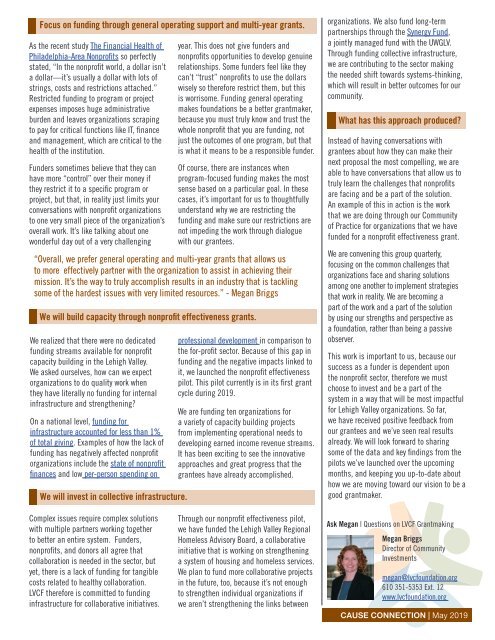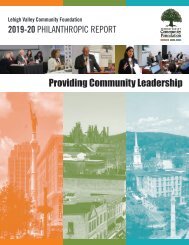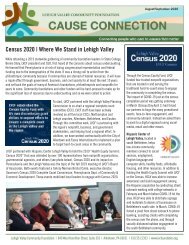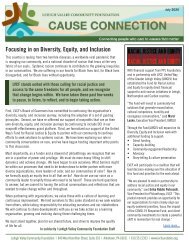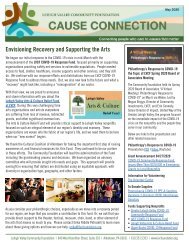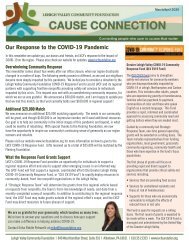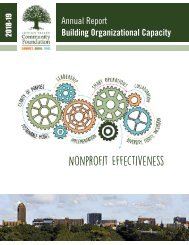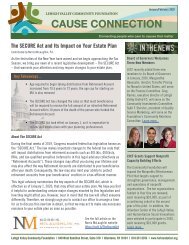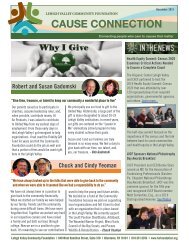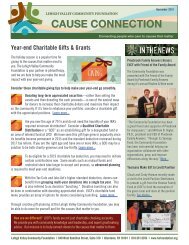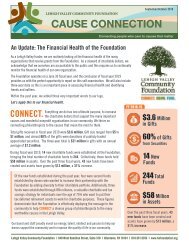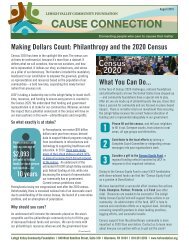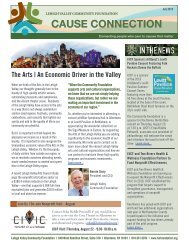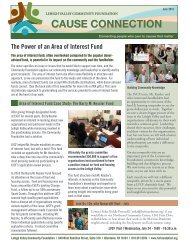LVCF Cause Connection May 2019 eNewsletter
Create successful ePaper yourself
Turn your PDF publications into a flip-book with our unique Google optimized e-Paper software.
Focus on funding through general operating support and multi-year grants.<br />
As the recent study The Financial Health of<br />
Philadelphia-Area Nonprofits so perfectly<br />
stated, “In the nonprofit world, a dollar isn’t<br />
a dollar—it’s usually a dollar with lots of<br />
strings, costs and restrictions attached.”<br />
Restricted funding to program or project<br />
expenses imposes huge administrative<br />
burden and leaves organizations scraping<br />
to pay for critical functions like IT, finance<br />
and management, which are critical to the<br />
health of the institution.<br />
Funders sometimes believe that they can<br />
have more “control” over their money if<br />
they restrict it to a specific program or<br />
project, but that, in reality just limits your<br />
conversations with nonprofit organizations<br />
to one very small piece of the organization’s<br />
overall work. It’s like talking about one<br />
wonderful day out of a very challenging<br />
We realized that there were no dedicated<br />
funding streams available for nonprofit<br />
capacity building in the Lehigh Valley.<br />
We asked ourselves, how can we expect<br />
organizations to do quality work when<br />
they have literally no funding for internal<br />
infrastructure and strengthening?<br />
On a national level, funding for<br />
infrastructure accounted for less than 1%<br />
of total giving. Examples of how the lack of<br />
funding has negatively affected nonprofit<br />
organizations include the state of nonprofit<br />
finances and low per-person spending on<br />
year. This does not give funders and<br />
nonprofits opportunities to develop genuine<br />
relationships. Some funders feel like they<br />
can’t “trust” nonprofits to use the dollars<br />
wisely so therefore restrict them, but this<br />
is worrisome. Funding general operating<br />
makes foundations be a better grantmaker,<br />
because you must truly know and trust the<br />
whole nonprofit that you are funding, not<br />
just the outcomes of one program, but that<br />
is what it means to be a responsible funder.<br />
Of course, there are instances when<br />
program-focused funding makes the most<br />
sense based on a particular goal. In these<br />
cases, it’s important for us to thoughtfully<br />
understand why we are restricting the<br />
funding and make sure our restrictions are<br />
not impeding the work through dialogue<br />
with our grantees.<br />
“Overall, we prefer general operating and multi-year grants that allows us<br />
to more effectively partner with the organization to assist in achieving their<br />
mission. It’s the way to truly accomplish results in an industry that is tackling<br />
some of the hardest issues with very limited resources.” - Megan Briggs<br />
We will build capacity through nonprofit effectiveness grants.<br />
We will invest in collective infrastructure.<br />
professional development in comparison to<br />
the for-profit sector. Because of this gap in<br />
funding and the negative impacts linked to<br />
it, we launched the nonprofit effectiveness<br />
pilot. This pilot currently is in its first grant<br />
cycle during <strong>2019</strong>.<br />
We are funding ten organizations for<br />
a variety of capacity building projects<br />
from implementing operational needs to<br />
developing earned income revenue streams.<br />
It has been exciting to see the innovative<br />
approaches and great progress that the<br />
grantees have already accomplished.<br />
organizations. We also fund long-term<br />
partnerships through the Synergy Fund,<br />
a jointly managed fund with the UWGLV.<br />
Through funding collective infrastructure,<br />
we are contributing to the sector making<br />
the needed shift towards systems-thinking,<br />
which will result in better outcomes for our<br />
community.<br />
What has this approach produced?<br />
Instead of having conversations with<br />
grantees about how they can make their<br />
next proposal the most compelling, we are<br />
able to have conversations that allow us to<br />
truly learn the challenges that nonprofits<br />
are facing and be a part of the solution.<br />
An example of this in action is the work<br />
that we are doing through our Community<br />
of Practice for organizations that we have<br />
funded for a nonprofit effectiveness grant.<br />
We are convening this group quarterly,<br />
focusing on the common challenges that<br />
organizations face and sharing solutions<br />
among one another to implement strategies<br />
that work in reality. We are becoming a<br />
part of the work and a part of the solution<br />
by using our strengths and perspective as<br />
a foundation, rather than being a passive<br />
observer.<br />
This work is important to us, because our<br />
success as a funder is dependent upon<br />
the nonprofit sector, therefore we must<br />
choose to invest and be a part of the<br />
system in a way that will be most impactful<br />
for Lehigh Valley organizations. So far,<br />
we have received positive feedback from<br />
our grantees and we’ve seen real results<br />
already. We will look forward to sharing<br />
some of the data and key findings from the<br />
pilots we’ve launched over the upcoming<br />
months, and keeping you up-to-date about<br />
how we are moving toward our vision to be a<br />
good grantmaker.<br />
Complex issues require complex solutions<br />
with multiple partners working together<br />
to better an entire system. Funders,<br />
nonprofits, and donors all agree that<br />
collaboration is needed in the sector, but<br />
yet, there is a lack of funding for tangible<br />
costs related to healthy collaboration.<br />
<strong>LVCF</strong> therefore is committed to funding<br />
infrastructure for collaborative initiatives.<br />
Through our nonprofit effectiveness pilot,<br />
we have funded the Lehigh Valley Regional<br />
Homeless Advisory Board, a collaborative<br />
initiative that is working on strengthening<br />
a system of housing and homeless services.<br />
We plan to fund more collaborative projects<br />
in the future, too, because it’s not enough<br />
to strengthen individual organizations if<br />
we aren’t strengthening the links between<br />
Ask Megan | Questions on <strong>LVCF</strong> Grantmaking<br />
Megan Briggs<br />
Director of Community<br />
Investments<br />
megan@lvcfoundation.org<br />
610 351-5353 Ext. 12<br />
www.lvcfoundation.org<br />
CAUSE CONNECTION | <strong>May</strong> <strong>2019</strong>


